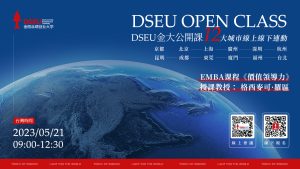1.The Eligible Candidate(MBA)
Perhaps you’d like a traditional MBA!
Pretend you are the founder and chairman of a very successful company in China, but you were so busy getting your business going that—much like Bill Gates or Steve Jobs in the United States—you didn’t have time to finish your MBA degree. Still, you (and especially your mother) would like to get this degree finished, for a number of reasons.
The great advantage of this approach is that you immerse yourself in a foreign culture, which in itself is one of the greatest things you can learn to help your future business life. Most importantly, you will build strong friendships and connections with fellow students and professors that will support you and your business for the rest of your career. And given the selection of core competencies in our traditional MBA program, you will upon graduating walk into your future business with all the skills you will need to start and operate it successfully.
2.Syllabus:Creation of An Entrepreneur: the Flow
The following typical course load is organized according to the actual order of the skills you will need as an entrepreneur to start, operate, and expand your own business. (Course specifics may be adjusted as appropriate.)
- Identifying opportunities: How to start my business, and what business?
- Business & Entrepreneurship:
featuring a study of the entrepreneurial mindset; the deep psychological causation behind shifting out of a static commercial outlook.
- Entrepreneurship:
featuring a study of the history & nature of international business , and possible alternative strategies: we use this and the following course to introduce a major theme of innovative thinking, which will continue throughout the degree program. - Economics:
featuring a discussion of the distribution and source of the net wealth of the world itself: financial belief systems.
- Business & Entrepreneurship:
- Setting up the structure: How do we want to work?
- Responsible BusinessLeadership:
featuring creative, profitable options to the hierarchical structure of corporate organizations. - Organizational Development and Change:
featuring answers to the challenge of making corporate community engagement more serious and effective. - Organizational Behavior:
featuring a study of how individuals in successful organizations lose their “edge”— especially creative & innovative advantage一and how to prevent this pattern.
- Responsible BusinessLeadership:
- Operations, once we’re started
- Strategic Management:
featuring the task of keeping our company on track to contribute towards a higher, international vision of commerce. - Marketing Management:
featuring a deep dive into the concept of advertising, exploring the possible benefits of cooperative marketing. - Managerial Accounting:
featuring the concept of proactive responsibility for finance, and setting up the necessary systems for accurate accounting for decision-making. - Managerial Finance:
featuring the process of financial decision-making, with an emphasis on exploring the deep psychological sources of innovative financial management thinking.
- Strategic Management:
- Doing the right thing, as we go
- Ethical Issues in Business:
featuring a deep discussion of what makes a business activity morally good or bad一learning to define this difference. - Values-centered Leadership:
featuring the concept of creating corporate excellence through the living example of management.
- Ethical Issues in Business:
- Going global: Covering bigger markets
- International Law:
featuring a discussion of strategies which emphasize the fulfillment of our full corporate tax responsibilities, and perhaps even offering additional tax beyond the required minimum, as a method of serving society.
- International Business:
featuring a study of the ideal of mastering the Global Roots of every country and culture in which we operate our new business. - Global Business Management:
featuring a collaborative exploration into innovative methods of motivating and uniting a multinational workforce. - International Human Resources:
featuring innovative methods of continually upgrading staff competencies in tech and humanizing, empowering applications of tech.
- International Law:
3.MBA Graduation requirements
14 courses of 3 academic credits each, total of 42 credits.
You will notice that the standard title of each course is accompanied by a “featuring” description, which gives you an indication of where the course will be going deeper into Global Roots. That is, you will get the standard high-quality, business school presentation of the general topic from a standard, high-quality textbook, and then go deeper: this is the winning feature of your time at DSEU.
4.Format of the Program
Format:Part-time
Duration and Credits:20 months, 42 credits
Bilingual:English, Chinese
5.Tuition Fee & Date of commencement
MBA Tuition Fee USD 72,000
MBA start in March 2023




